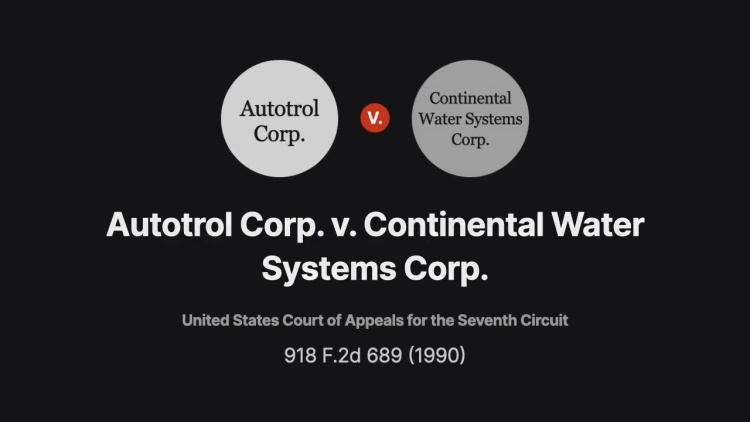Autotrol Corp. v. Continental Water Systems Corp.
United States Court of Appeals for the Seventh Circuit
918 F.2d 689 (1990)

- Written by Sara Rhee, JD
Facts
In May 1986, Autotrol Corporation (Autotrol) (plaintiff) and Continental Water Systems Corporation (Continental) (defendant) contracted to manufacture and sell water-purification systems. Continental held the patent on new technology to be used, and Autotrol, a growing company in high demand, was to manufacture a new control. Both companies would then sell completed systems. At the time of contracting, the parties had not agreed to product specifications. The contract contained a provision stating that if the parties could not, in good faith, agree to product specifications by June 30, later extended to July 17, then either party could terminate the agreement at that time. After that time, Continental could not terminate the contract except in certain enumerated circumstances. The contract also prohibited oral modifications. On July 17, the parties had not agreed to product specifications, but neither exercised its termination right. Additionally, Continental encouraged Autotrol to continue working for almost a year, causing Autotrol to continue incurring expenses. Continental then terminated the contract. Autotrol sued Continental for breach of contract. The jury held in Autotrol’s favor and awarded $245,000 in out-of-pocket expenses and over $700,000 in overhead expenses. Continental appealed.
Rule of Law
Issue
Holding and Reasoning (Posner, J.)
What to do next…
Here's why 907,000 law students have relied on our case briefs:
- Written by law professors and practitioners, not other law students. 47,100 briefs, keyed to 996 casebooks. Top-notch customer support.
- The right amount of information, includes the facts, issues, rule of law, holding and reasoning, and any concurrences and dissents.
- Access in your classes, works on your mobile and tablet. Massive library of related video lessons and high quality multiple-choice questions.
- Easy to use, uniform format for every case brief. Written in plain English, not in legalese. Our briefs summarize and simplify; they don’t just repeat the court’s language.





